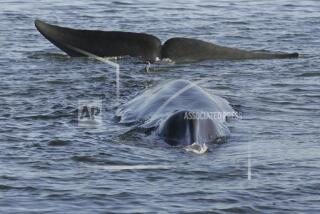After Global Outcry, Russia Vows to End Renewed Whaling
- Share via
MOSCOW — For the first time in 13 years, international trade in whales resumed this week when a Russian ship arrived in Japan carrying 13 tons of meat and blubber.
In a deal worked out quietly with Japan, Russian hunters killed 36 belugas--the small white whales found in northern waters that had not been hunted commercially since the 1960s.
When word of the hunt leaked out, it touched off an avalanche of protests from international environmental groups. The U.S. government joined in putting strong pressure on Russia to stop commercial whaling immediately.
Apparently, the message got through. A day after the shipment arrived in Japan, Russian officials agreed to order a halt next week to further hunting of beluga whales.
“The international reaction is very, very negative,” said Valentin Y. Ilyashenko, chief of the Directorate for Protection of Biodiversity, who initially approved the hunt. “The insignificant revenues we can get from selling white whale meat abroad are incomparable with the wave of growing indignation in the world.”
International law prohibits the commercial hunting of large whale species, but the approximately 15-foot beluga is not covered by the ban because of its smaller size. Until now, whaling nations had observed a moratorium on commercial hunting of all the smaller species.
“To unilaterally engage in commercial whaling without notifying us really caught us off guard,” said Roland Schmitten, director of international affairs for the U.S. National Oceanic and Atmospheric Agency. “I think the Russians were surprised at how swiftly reaction came.”
While the beluga apparently has recovered somewhat from the days when it was hunted, biologists worry that its population is too small to sustain renewed whaling. In addition, they were concerned that the Russians would focus entirely on one subgroup of belugas living near the western shore of the Sea of Okhotsk, threatening the viability of that population.
Environmentalists have long objected to Russian whaling practices.
Under international rules allowing native people to hunt whales, Russia permits the annual killing of dozens of California gray whales in the Bering Sea near Alaska. Some of the whale meat is used to feed caged foxes being raised for their pelts.
Before commercial whaling was banned in 1986, Russian whalers had a history of killing far more whales than quotas allowed and then underreporting the slaughter. They also commonly misreported the species of whales so as to understate the number of rarer whales killed.
Opponents of the beluga hunt were worried that such reporting practices would resume and that whales belonging to endangered species would be killed and sold in Japan as belugas.
Schmitten said environmental groups were galvanized by the issue and sprang into action during a 10-day blitz, urging Russia to halt the whaling and lobbying members of the U.S. Congress to take action.
Masha Vorontsova, who heads the International Fund for Animal Welfare in Moscow and helped organize the opposition, said she’ll be watching closely to see if the government carries out its promise to halt the beluga hunt.
“I can’t understand how people can kill these marvelous animals for meat,” she said. “To me, it’s like cannibalism.”
In Japan, whale meat and blubber are delicacies, and the country has tried various means to secure whale products for its markets. Under what it claims is a “scientific” study, it kills up to 540 minke whales a year and sells the meat commercially--even though the animals are covered by the commercial hunting ban.
Valery V. Fedorov, chief scientist with the Directorate for the Protection of Biodiversity, said Japanese businessmen approached Russia with the idea of a joint venture to bring beluga whales to the Japanese market.
He said Russian scientists believe that the population of belugas in Russian waters is large enough to sustain a hunt of 2,000 animals a year. The agency issued a permit allowing hunters in the Sea of Okhotsk to kill 200 white whales.
“Our agency does not deal with issues of morality and ethics,” Fedorov said. “We are solely responsible for preserving the stock of animals in general--not every single whale in particular.”
More to Read
Sign up for Essential California
The most important California stories and recommendations in your inbox every morning.
You may occasionally receive promotional content from the Los Angeles Times.













